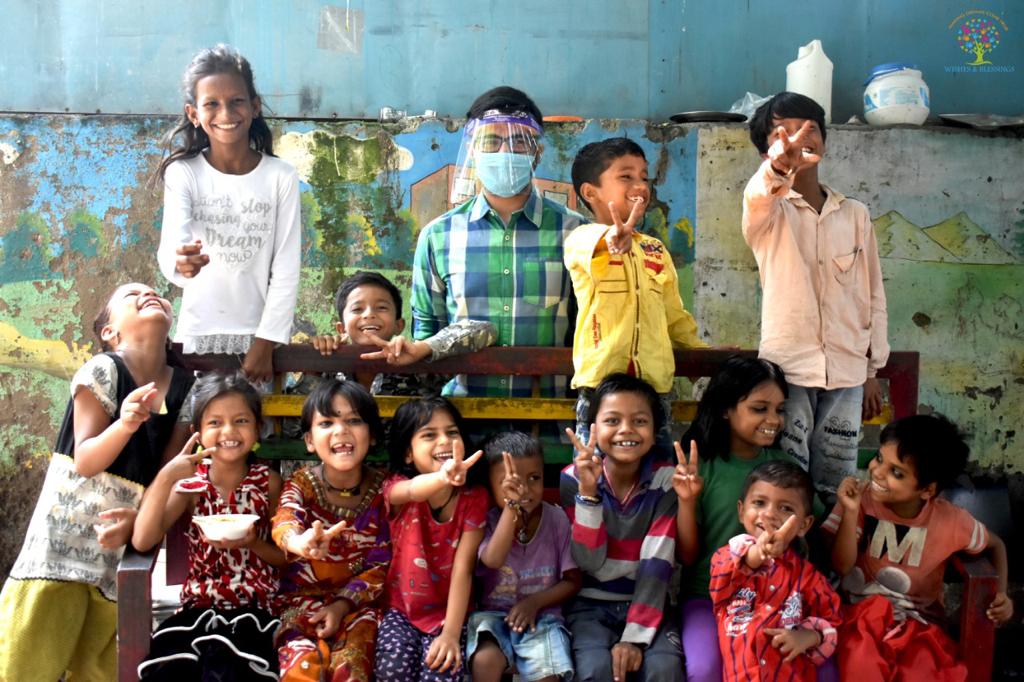I recently visited the Munirka Shelter Home, where there are 3 rain baseras (shelters). One is for males, the second for females and the third one for children.
So, as we all have certain preconceived notions about these shelters homes, I too had such a notion that they would be poorly constructed and dirty. However, to my surprise, they were extremely clean and I could barely see any signs of poor construction (ex: leakage, broken walls etc). Also, since the spread of Covid is once again on the rise in the national capital, it only added onto my fears. However, all safety protocols were being followed at the centre.
My team and I reached the centre around 11 AM and straight away headed to the shelter for the children. We were greeted by the teacher (Pooja Ma’am), who was teaching basic hygiene lessons to the 18 children that were currently present at the centre. On seeing new faces, the children were overjoyed and greeted us all a good morning (remember how we all would say it in chorus back in school; they also said it in exactly the same way). After the initial greetings, we introduced ourselves and also asked the children to introduce themselves, during which they told us their names and whether they like to study or not. To my utter surprise, most of the children said “YES”, they love studying. This took me back to my school days and how I never liked studying. It was at this moment that I realised how we often take for granted things that we get so easily. For these children, education did not come as easy as it was for us. One could easily sense the commitment in these young eyes to break the vicious circle of poverty and how they valued education.



The children then continued with their teacher, learning the 8 steps to wash their hands properly. After that, they went onto read ABCD, followed by an exercise of writing. It was during this period when one of the child ran away to the next shelter where his mom was, and when enquired, he did not wish to come back and his mother was also reluctant in sending him back to study. On discussing this with the teacher, she expressed the challenges she has been facing at this centre. Since this is a 24/7 shelter, the parents are around and some of the parents are not interested in making their children study. They prefer that their children go out on the street and beg, which brings in some money, rather than studying, which has no tangible monetary inflow in the short run. They do not understand the long term benefits of studying and have convinced themselves that they shall never be able to break out of this vicious circle. However, I believe it is our duty to educate them about the importance of education and with proper counselling of the parents, we shall be able to overcome this challenge soon.
Another instance to highlight was my conversation with Saddam, a 9-year-old boy, while he was doing a maths problem.



When I asked him what he wants to become once he grows up, he exclaimed that he would want to become a police officer. I could see the glee in his eyes when he said this. Despite the challenges these kids have faced, it is amazing to witness how determined they are to change their future and how they are tirelessly working hard towards it. As part of the conversation, I asked him what would he wish for, if a genie granted him three wishes. What amazed me was that he said he had none! When I enquired further, he said that he was happy and did not wish for anything more.
After the study sessions were over, we decided to play a game of Antakshari, and seeing the enthusiasm in those young eyes was nothing short of blissful. We then decided to go outdoors and do some physical exercise. The children decided that we all could have a racing competition and oh, boy! they thoroughly enjoyed it. After the race, a small girl came up to us and said, “Bhaiya and Didi, come with me, I want to show you something”, and she took us to a cabinet in which they had kept two small birds. They told us how they take care of the birds and feed them regularly. This showed their compassion towards other creatures, a quality that I believe is one of the most important in any human being.
It was then lunch time, and all the children got their plates, rinsed them, as well as washed their hands. The day’s menu had Rajma Chawal, one of the favourites amongst these children and they were extremely happy to see their favourite dish. We served the food to them, where they would tell us to put more or less, as per their appetite.
This was a very unique experience, since they understood the importance of food wastage and only asked for as much food as required to take care of their hunger. After they were done eating, they went outside, cleaned their plates and put them back. We finally said goodbye to them and left with a heart full of memories.
About the Author
Manik loves to spend time with his family, listening inquisitively to the stories his grandparents share. He has always been passionate about helping society and thus gave up his Investment Banking career to pursue his passion. Having majored in finance, he wishes to increase financial literacy and awareness in the country.





